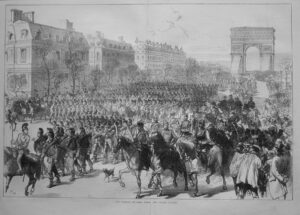The Franco-Prussian War Primer
War Termination
The Franco-Prussian War provides a notable example of a war unnecessarily prolonged, even though its course was practically set in stone during the first few months of combat. As Fred Iklé states in Every War Must End: “It often happens in wars that the weaker party makes no attempt to seek peace while its military strength can still influence the enemy, but fights until it has lost all its power to bargain.”[1] France during the Franco-Prussian War is a prime example of this self-destructive perseverance. Soon after starting the war, France had roughly half of its premier professional army removed from the fight. With the rest captured, along with its Emperor, after a futile rescue mission less than six months into the war. Germany on the other hand was faced with success after success and a clear path to the French capital. Even though the situation seemed dire for France they instead chose to overthrow the empire and continue fighting. One factor in this decision is clear, the French citizenry in the capital made it known to their politicians that they had no desire to end the war. Even the most moderate politicians in Paris understood that they needed to support a continuation of the war if they wanted any hope of continuing their careers.
Along with the will to continue fighting, the French nation had the capacity to do so, with hundreds of thousands of militiamen and soldiers throughout France, and many even in Paris alone. If it were just one of those factors, either capacity or willingness, then peace may have been achievable early on. Since the French citizenry in Paris had both, there was no likelihood of peace being achievable. Germany also did not make the negotiations an easy thing. The German armies faced success after success in battle, so they likely felt they had little reason to soften their demands and accept only an indemnity from the French negotiators. Another factor was that A French negotiator noted otto von Bismarck to be uncharacteristically irrational when it came to France specifically. Bismarck blamed France for a good deal of Germany’s trouble historically.[2] The Franco-Prussian War was a conflict in which France having started the war, was unwilling to accept the embarrassment of cowing to the demands of their enemy while French forces still had the ability to fight on. The other side, having been attacked, was unwilling to end the war without gaining significant rewards while they were continuously successful on the field. The only thing that could change this was when one nation had the harsh realities of its military situation made clear to its urban population and politicians.
[1] Iklé, Fred Charles, Every War Must End, New York: Columbia University Press, 1971, P.34
[2] Wawro, The Franco-Prussian War, P.239
